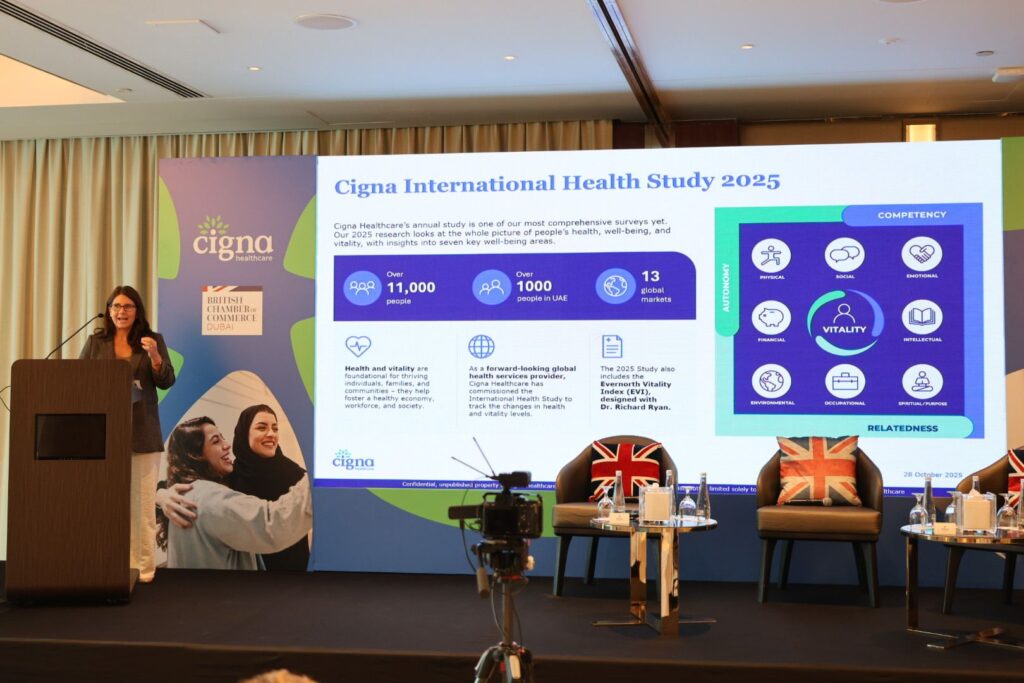Mental health becomes the UAE’s top health priority
Mental health has become the number one personal health priority for people in the UAE, marking a powerful cultural shift in how well-being is defined across the nation.
According to the Cigna Healthcare International Health Study 2025: UAE Edition, UAE residents now rank mental well-being above physical health, a reflection of growing awareness, open dialogue, and national focus on holistic health.
The findings in the UAE report, authored by mentl, place the Emirates as a global leader in overall well-being and vitality, standing out as one of the world’s strongest performers even as international well-being averages have fallen. While global vitality dipped to 63.2, the UAE held firm at 73.3, ranking second among 13 markets.
Every well-being pillar, from mental and physical to workplace and family, scored above global benchmarks, often by double-digit margins.
Vitality Stays Strong, Well-being Rises Across Every Pillar
Despite a global decline in vitality and well-being, the UAE’s overall well-being surged from 62% in 2024 to 70% in 2025, showing consistent growth in every key dimension.
- Physical well-being: 69% (+9 points year-on-year)
- Mental well-being: 64% (+7 points)
- Spiritual well-being: 64% (+7 points)
- Social well-being: 56% (+6 points)
- Family well-being: 71% (+1 point) – the highest-rated pillar
- Financial well-being: 35% (+3 points) – still the lowest-rated, though above global average
The data also highlights striking gender differences. Men recorded higher well-being across every category, 73% overall compared to 64% for women, with gaps exceeding 10 points in mental, financial, workplace, and physical well-being. Working individuals also outperformed non-working respondents across all metrics.
“Family remains the UAE’s superpower,” the report notes, yet nearly half of residents still report feelings of loneliness or isolation, showing that even in a culture rich in connection, emotional well-being remains an evolving frontier.

Leah Cotterill, CEO, Cigna Healthcare MEA (outside KSA), said, “Despite global declines, vitality in the UAE continues to rise, underscoring the country’s commitment to making health and well-being a true national priority.
“Initiatives such as the Federal Mental Health Law, Dubai’s AED105m ($28.6m) Mental Health Framework, and the integration of AI-driven healthcare reflect a forward-looking vision that places people at the centre of progress. At Cigna Healthcare, we are proud to support this agenda by providing whole-health solutions that span physical, mental, financial, and workplace well-being.
“The UAE is not only improving the health of its people today but also setting global benchmarks for how nations can build resilient, future-ready societies.”
Younger Generations Struggle Despite Broader Gains
While the national picture is overwhelmingly positive, younger residents face unique challenges. Among 18-24-year-olds, stress levels have reached 89%, the highest of any age group and up ten points from the previous year. Alarmingly, 21% describe their stress as unmanageable.
This age group also reports:
- 39% increased emotional sensitivity (+13pts)
- 78% feel they have nothing to look forward to (+9pts)
- 82% struggle to initiate tasks (+9pts)
- 69% experience loneliness, the highest of any generation
Family well-being remains a top concern for this group, with 31% naming it their top health priority, even as their sense of family connection has slightly declined (69%, down three points).
These results underline the generational contrast between the UAE’s high-performing well-being culture and the emotional pressures faced by its youngest adults, who are more likely to experience isolation and burnout even as the wider population grows more resilient.

Workplace Well-being Rises – But Gaps Persist
Workplace well-being climbed to 51% (+4pts year-on-year), reflecting stronger engagement and enthusiasm among UAE employees.
Job satisfaction stands at 60%, compared to 52% globally, while 80% say they are willing to work harder for their company’s success (versus 61% globally). The UAE also shows one of the highest levels of workplace enthusiasm worldwide, with 75% saying they are passionate about their jobs.
Yet, gender divides are clear.
- Men: workplace well-being +5pts vs last year
- Women: largely unchanged, but with rising stress levels (37%, up 5pts)
Women were also less likely to feel supported or recognised:
- 50% said their manager understands them (down 6pts)
- 45% felt supported in balancing personal commitments (down 10pts)
- 32% felt appropriately recognised for their work (vs 39% of men)
Nearly nine in ten men and eight in ten women work more than 40 hours per week, while 67% of all employees are considering changing jobs – almost double the global average (36%). Despite this churn, 84% of UAE employees support a four-day work week, with both men (83%) and women (88%) believing it would improve work-life balance.
These trends suggest a workforce that is both deeply committed and acutely aware of the need for better balance, flexibility, and recognition.
Stress Remains High but Shows Shifting Causes
Stress levels in the UAE remain among the highest globally, with 84% of employees reporting feeling stressed – 11 points above the global average (excluding Japan and South Korea). The overall rate is steady year-on-year, but the drivers of stress have changed.
Family finances have now overtaken the cost of living as the top cause of stress, affecting 41% of respondents.
Other leading stressors include personal finances (37%) and the cost of living (37%), both of which have declined since last year.
The impact of stress is also clear:
- 42% report disrupted sleep – the most common effect
- Women are more likely than men to experience disrupted sleep, lower productivity, and emotional sensitivity
- 39% of young adults (18-24) report high emotional volatility, the highest of any group
These results highlight that while the UAE’s vitality remains strong, financial and family-related pressures continue to test emotional resilience.
Four-Day Week Support Reflects Evolving Work Values
The UAE’s workforce demonstrates some of the world’s strongest support for progressive work models.
A remarkable 84% of UAE employees support the idea of a four-day work week (vs 75% globally), viewing it as a key to improving productivity and well-being. Both men and women believe it would enhance balance and reduce burnout.
The report also shows 89% of men and 79% of women currently work 40+ hours per week – suggesting that enthusiasm for shorter working weeks is driven by lived experience of intense work demands.
Despite those pressures, 75% of workers describe themselves as enthusiastic about their jobs, reflecting a motivated but stretched workforce seeking smarter ways to sustain performance.

UAE Leads on AI Optimism and Healthcare Innovation
Beyond the workplace, the UAE ranks among the top three most positive nations globally when it comes to artificial intelligence in healthcare.
61% of UAE respondents believe AI will improve their care experience, compared to 45% globally.
Top expected benefits include:
- Shorter waiting times: 38% (vs 34% globally)
- Better diagnostic accuracy: 33% (vs 28%)
- Lower administrative costs: 31% (vs 27%)
- Improved doctor support: 35% (vs 28%)
This optimism aligns with the UAE’s broader national strategy for digital transformation and innovation in healthcare, reflecting public confidence that technology can enhance both access and outcomes.
However, barriers remain.
Nearly a third of UAE residents report being unable to access medical care due to cost (32%, +3pts vs last year), while 38% have avoided care due to long wait times, and 54% say these delays negatively affected their work.
A Nation of High Vitality – and High Expectations
The Cigna Healthcare International Health Study 2025 paints a portrait of a nation whose well-being trajectory continues to defy global trends. The UAE’s vitality, resilience, and optimism remain among the highest worldwide, even as global averages slide.
But the findings also highlight a new frontier: sustaining mental and emotional well-being across all demographics, particularly younger adults and working women, as expectations for health, purpose, and balance continue to rise.
As mental health takes centre stage in the UAE’s definition of well-being, the message is clear, the nation is not just feeling better than much of the world; it’s redefining what it means to thrive.